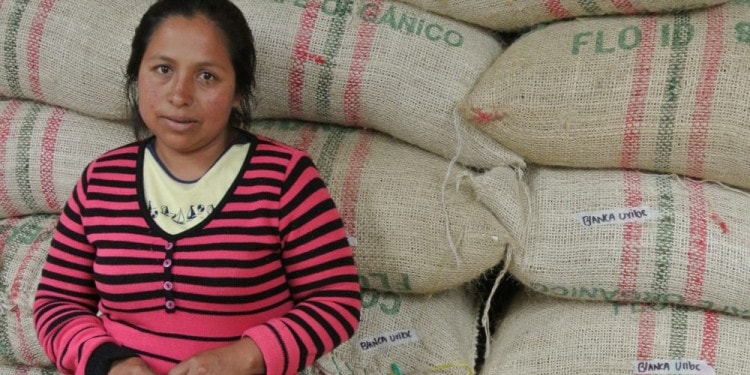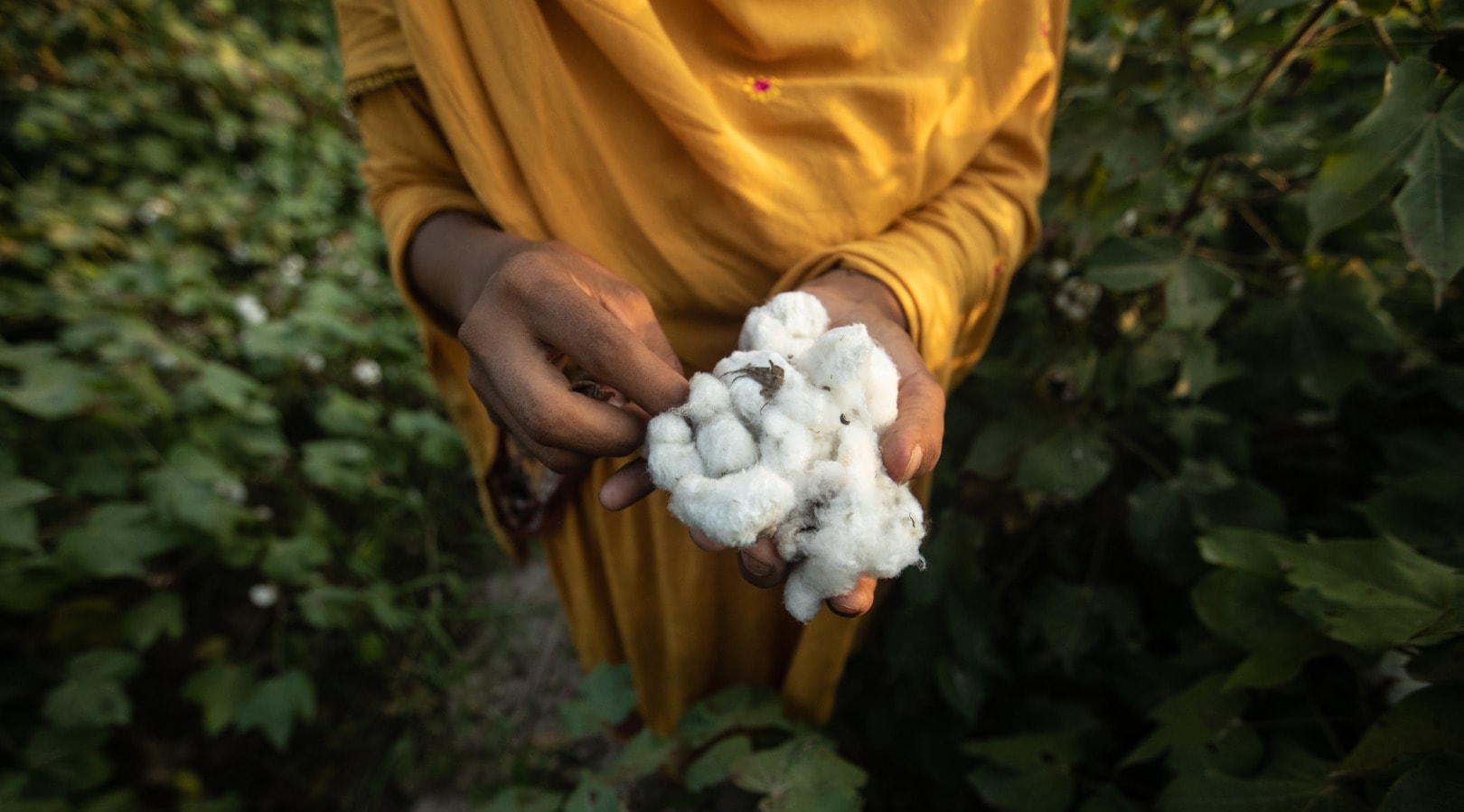The average woman around the world spends significantly more time than the average man doing unpaid domestic labor. As a result of gender disparity, women farmers are up to 50% less likely than men to adopt research-proven good agricultural practices.
It’s 3 o’clock in the morning. The crickets have stopped chirping and hours will pass before the rooster crows. Elizabeth Garzón Piamba is preparing the fire for breakfast while her family sleeps. After she feeds her children and gets them ready for school, she heads out to work as the sun just peeks over the horizon. Elizabeth is a coffee farmer. And she has 4,000 trees to take care of.
After a full day of planting, pruning, or harvesting, she returns home to feed her family again and put her children to bed. Long after the sun has set, and more chores are done, Elizabeth finally gets to rest. Ready to do it all again the next morning.

A coffee farmer and cooperative member walks with her child among drying coffee at Root Capital client Pangoa in Junin, Peru.
The average woman around the world spends significantly more time than the average man doing unpaid domestic labor. This issue is particularly acute in rural communities that lack the time-saving luxuries of laundry machines, gas stoves, and reliable electricity. For rural women in most low-income countries, this works out to as many as 12 hours more per week than men. This leaves them with little time to attend agronomic workshops or receive coaching that could help them maximize the income from their small farms.
Related topics: Gender inequality still a problem – The gender dimension of climate change – A gender lens
Women who do attend training often can’t fully benefit from the information offered. Gender disparity in educational attainment, combined with workshops that are designed primarily for men, leaves women farmers at a disadvantage. On top of that, women are less likely to own the land on which they work, and lack equal access to credit, tools, and inputs. The result? Women farmers are up to 50% less likely than men to adopt research-proven good agricultural practices like organic fertilization, farm renovation, and shade-grown coffee.
This is a problem not just for women, but for rural communities overall. When farmers adopt agricultural best practices, they increase crop yields and raise their incomes. According to FAO estimates, if women had equal access to agricultural inputs and training services, harvests could rise by 20-30% per household. This change could feed up to 17% of the people currently suffering from hunger worldwide.
These barriers are a reality for millions of women farmers around the world. But agricultural businesses—and their employees, like Elizabeth—can connect women with the tools they need to unlock more sustainable livelihoods.

CoSurCa staff outside of the cooperative offices following a Root Capital advisory services workshop.
Elizabeth is a member of ASPROSI, a farmer association in Colombia that receives financing and advisory support from Root Capital through its parent organization CoSurCa. She also works as a tecnica: an agricultural technician who leads workshops and on-farm training. As a tecnica, Elizabeth instructs ASPROSI’s 175 farmer-members on organic practices that can increase their yields and boost incomes.
The vast majority of agricultural technicians around the world are men. But ASPROSI proactively seeks out and trains women in these roles—in fact, three-quarters of their agronomic staff are women. And this representation matters for the women farmers of ASPROSI, who make up nearly one-third of the association’s members. As Elizabeth notes: “Only as a woman do I understand that women are first up to prepare breakfast… and the last to sleep at night.” This deep understanding of members’ challenges allows the association’s extension team to tailor their training so that all farmers can take advantage of the information being offered.
Elizabeth has noticed how, in her role as instructor, she has a positive impact on the confidence of women participants. She says that while the methods she teaches seem daunting at first to women farmers, seeing Elizabeth successfully demonstrate these practices gives the women confidence that they can adopt them too.
Elizabeth is what we at Root Capital call a “hidden influencer”: roles like agronomists, accountants, and mid-level managers who interact daily with farmers and employees. While less visible than a business’ top-tier leadership, they’re crucial to the organization’s success. Women in these roles, as on the farm, are less likely to receive training than men. But when women like Elizabeth fill these positions, their impact ripples throughout the organization, positively affecting both men and women farmers.
 Norma Argueta manages the warehouse at Root Capital Client COMSA in Honduras.
Norma Argueta manages the warehouse at Root Capital Client COMSA in Honduras.
Our Women in Agriculture Initiative seeks to train and support these hidden influencers because, when they succeed, so do the businesses they sustain. Nearly a decade ago we launched new efforts to ensure that women had an equal opportunity to participate in our workshops. After seeing underwhelming improvements, we realized we needed to go beyond removing barriers and actively encourage participation by women employees. We have since piloted new initiatives, including our “third participant policy” by which any enterprise participating in a workshop is allowed to bring an extra attendee as long as she is a woman. We have also recognized how crucial it is to equip our internal team with techniques for advancing gender inclusion, hosting a number of workshops to deepen our own collective understanding.
In 2019, women made up 30% of our workshop participants for the first time—a big step in the traditionally male-dominated industries in which we work. In order to ensure women can benefit from our advisory services, we are adapting our curriculum to be more gender-sensitive. This new version directly addresses the unique challenges facing women farmers, agribusiness employees, and leaders. Through innovative programs like our Talent Partnerships, we’re also providing employment opportunities for young women—the future hidden influencers of agricultural enterprises.
As for Elizabeth: While the days are long, she knows she’s having an impact on her community, her family, and herself. “It’s not just about producing organic coffee,” she says. “It’s more. It’s about my kids, my livelihood.”
About the author: Rob Hefferon is a Communications Associate at Root Capital
EDITOR’S NOTE: The opinions expressed here by Impakter.com columnists are their own, not those of Impakter.com. Photo Credit: Sean Hawkey and Root Capital
















